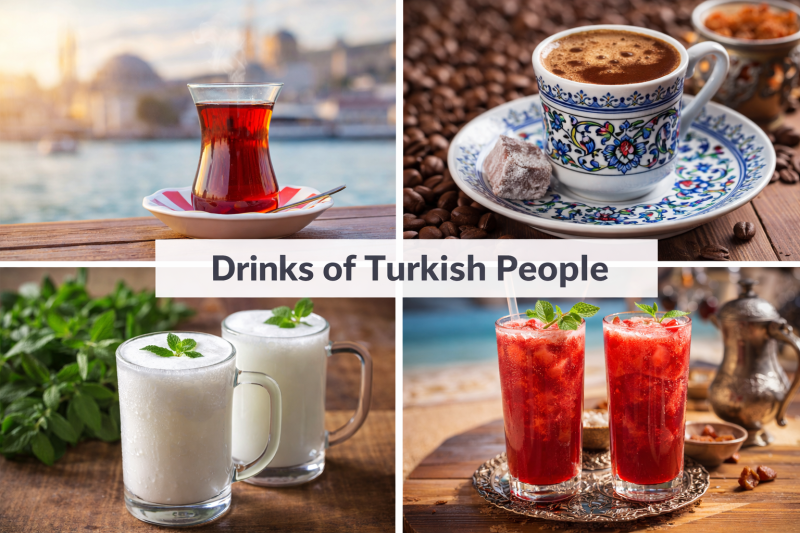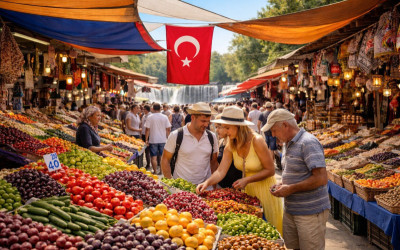Discover the Authentic Flavors of Turkey: Traditional Drinks of Turkish People
What Do Turkish People Drink?
Turkey’s beverage culture is deeply rooted in daily life, traditions, and social interactions. Drinks in Turkey are not consumed randomly; they are closely connected to hospitality, climate, cuisine, and centuries-old customs. From early morning until late at night, beverages accompany conversations, meals, business meetings, and family gatherings.
Turkish people drink a wide variety of non-alcoholic and alcoholic beverages, but traditional drinks still dominate everyday life. Tea, coffee, yogurt-based drinks, fruit sherbets, and herbal infusions form the backbone of Turkish drinking culture. Understanding what Turks drink offers valuable insight into how Turkish society functions on a social and cultural level.
Turkish Tea Culture
Turkish Black Tea (Çay): A Daily Ritual
Turkish black tea, known simply as çay, is the most widely consumed beverage in Turkey. It is drunk at breakfast, after meals, during work breaks, and while socializing with friends. Tea is served in small, tulip-shaped glass cups that highlight its deep red color.
Tea preparation follows a traditional method using a double teapot called a çaydanlık.
How Turkish Tea Is Brewed
-
The lower pot contains boiling water
-
The upper pot holds loose black tea leaves brewed with hot water
-
Tea is diluted with hot water according to personal preference
Tea is usually served plain or with sugar cubes. Milk is almost never added. Offering tea to guests is considered a sign of respect and hospitality, whether at home, in shops, offices, or even government buildings.
Apple Tea (Elma Çayı): A Sweet Herbal Favorite
Apple tea is a popular herbal beverage, especially among visitors to Turkey. Unlike black tea, apple tea is caffeine-free and made by infusing dried apple pieces or powdered apple blends in hot water.
Apple tea is commonly served in tourist areas, markets, and souvenir shops as a welcoming gesture. Its naturally sweet and fruity flavor makes it easy to drink and appealing to all age groups.
Although not traditionally consumed daily by locals like black tea, apple tea has become an important part of Turkey’s beverage identity.
Ayran: Turkey’s Most Refreshing Drink
Ayran: The Traditional Yogurt Beverage
Ayran is one of the most iconic non-alcoholic drinks in Turkey. It is made by mixing yogurt, cold water, and a small amount of salt. Simple in ingredients yet powerful in effect, ayran is especially popular during hot weather.
This drink is deeply tied to Turkish cuisine and is commonly served alongside grilled meats, kebabs, pide, and döner.
Why Ayran Is So Popular
-
Refreshes the body in hot climates
-
Helps digestion after heavy meals
-
Naturally rich in protein and probiotics
-
Widely available in homes, restaurants, and markets
Ayran is often considered Turkey’s national drink and reflects the country’s strong yogurt-based culinary tradition.
Turkish Coffee: More Than Just a Drink
Turkish Coffee: Cultural Heritage in a Cup
Turkish coffee is not simply a beverage; it is a cultural ritual. Finely ground coffee beans are brewed slowly without filtering, creating a strong, thick, and aromatic coffee served in small cups.
Turkish coffee is recognized by UNESCO as an Intangible Cultural Heritage of Humanity, highlighting its importance in social and cultural life.
Coffee is usually served with a glass of water and sometimes Turkish delight. It is commonly enjoyed after meals or during long conversations.
How to Make Traditional Turkish Coffee
Ingredients and Preparation
-
2 teaspoons of finely ground Turkish coffee per cup
-
Cold drinking water (1 Turkish coffee cup per serving)
-
Sugar added according to preference
Brewing Method
-
Add coffee, water, and sugar into a cezve
-
Stir until fully dissolved
-
Heat slowly over low heat
-
Remove from heat when foam forms
-
Distribute foam into cups
-
Boil once more and pour evenly
The key to good Turkish coffee is patience and low heat, which allows rich foam and deep flavor to develop.
Coffee Fortune Telling (Tasseography)
Coffee fortune telling is a long-standing social tradition in Turkey. After finishing Turkish coffee, the cup is turned upside down onto the saucer. Once cooled, the patterns formed by coffee grounds are interpreted.
This practice is typically done among friends in a relaxed setting. While not taken seriously as a form of prediction, it remains a fun and symbolic part of Turkish coffee culture.
Fruit Sherbets: Traditional Cooling Drinks
Sherbet (Şerbet): A Historic Refreshment
Sherbets are traditional non-alcoholic beverages made from fruit extracts, flowers, sugar, and water. Long before modern soft drinks, sherbets were consumed in Ottoman palaces and public gatherings.
Common sherbet flavors include:
-
Lemon
-
Rose
-
Pomegranate
-
Quince
-
Tamarind
These drinks are especially popular during summer months and religious occasions. Sherbets are valued for their refreshing, cooling, and sometimes medicinal properties.
Herbal Teas in Turkish Daily Life
Popular Herbal Infusions
In addition to black tea, Turks frequently drink herbal teas for relaxation and health purposes.
Common herbal teas include:
-
Linden tea (ıhlamur)
-
Sage tea (adaçayı)
-
Mint and lemon tea
-
Chamomile tea
These teas are often consumed in the evening or during colder months and are traditionally associated with comfort and wellness.
Do Turks Drink Alcohol?
Alcohol Consumption in Turkey
Yes, Turks do drink alcohol, but consumption varies depending on personal, cultural, and religious preferences. Alcohol is legal in Turkey and widely available in restaurants, bars, hotels, and tourist areas.
However, alcohol does not play the same everyday role as tea or coffee in Turkish culture. Many Turks may drink alcohol socially rather than regularly.
Popular Alcoholic Beverages in Turkey
Raki: Turkey’s Signature Spirit
Raki is the most famous alcoholic drink in Turkey. It is an anise-flavored spirit that turns milky white when mixed with water, earning the nickname “Lion’s Milk.”
Raki is traditionally consumed slowly, accompanied by meze dishes and long dinners. It is closely associated with social gatherings and conversation.
Beer and Wine in Turkey
Beer is widely consumed, with Efes being the most well-known brand. It is commonly enjoyed in casual settings, especially during summer.
Turkey also has a growing wine culture, with vineyards producing red, white, and rosé wines. Turkish wines have gained international recognition, particularly from regions such as Thrace and Central Anatolia.
Turkish Hospitality and Beverage Culture
Offering Drinks as a Sign of Respect
Hospitality is one of the strongest values in Turkish society. Offering a drink to guests is considered essential and polite.
Whether visiting a home, shop, or office, guests are almost always offered tea or coffee. Refusing is acceptable, but accepting is often seen as a gesture of friendliness and openness.
Traditional Coffeehouses and Ember-Brewed Coffee
In some traditional cafés and coffeehouses, Turkish coffee is brewed over hot embers. This slow-cooking method enhances flavor and aroma, making the coffee richer and smoother.
Coffee prepared this way is highly appreciated and remains popular in historic areas and traditional settings.
Traditional Turkish Drinks as a Cultural Experience
The drinks of Turkey reflect the country’s deep-rooted traditions, climate, and social structure. From endless glasses of tea to the ritual of Turkish coffee, from cooling ayran to historic sherbets, each beverage tells a story.
Experiencing Turkish drinks is not just about taste; it is about connection, hospitality, and shared moments. Whether you are traveling through Turkey or learning about its culture, exploring traditional Turkish beverages offers an authentic and unforgettable insight into daily life in this remarkable country.
Frequently Asked Questions About Turkish Drinks
What is the most popular drink in Turkey?
The most popular drink in Turkey is Turkish black tea (çay). It is consumed throughout the day by people of all ages and social backgrounds. Tea is deeply embedded in daily routines, social interactions, and hospitality culture across the country.
Do Turkish people drink coffee every day?
Turkish people do drink coffee regularly, but not as frequently as tea. Turkish coffee is usually consumed after meals, during social gatherings, or when hosting guests. It is seen more as a cultural ritual than a daily hydration drink.
What makes Turkish coffee different from other coffees?
Turkish coffee is made from very finely ground coffee beans and brewed without filtering. It is cooked slowly in a small pot called a cezve and served with the coffee grounds still in the cup. The foam, strong aroma, and thick texture distinguish it from other coffee styles.
Is ayran a healthy drink?
Yes, ayran is considered a healthy and natural drink. It is made from yogurt, water, and salt, and is rich in protein and probiotics. Ayran helps digestion and is especially refreshing in hot weather, making it a common choice with heavy meals.
Is apple tea traditionally Turkish?
Apple tea is popular in Turkey, especially in tourist areas, but it is not a traditional daily drink like black tea. It is an herbal infusion that has become widely associated with Turkish hospitality and is often served to visitors.
What are sherbets in Turkey?
Sherbets are traditional non-alcoholic drinks made from fruit, flowers, sugar, and water. They have a long history dating back to the Ottoman period and are known for their refreshing and cooling properties, especially during summer months.
Do Turks drink alcohol?
Yes, alcohol is consumed in Turkey, but habits vary depending on personal, cultural, and religious preferences. Alcohol is legal and available in restaurants, bars, and hotels, particularly in major cities and tourist destinations.
What is raki and how is it drunk?
Raki is Turkey’s most famous alcoholic drink. It is an anise-flavored spirit that is usually mixed with water and consumed slowly. Raki is traditionally enjoyed with meze dishes and long conversations rather than quick drinking.
Is wine popular in Turkey?
Yes, Turkey has a growing wine culture. The country produces a wide range of red, white, and rosé wines using both local and international grape varieties. Turkish wines are increasingly recognized for their quality.
Why is tea offered everywhere in Turkey?
Offering tea is a fundamental part of Turkish hospitality. Tea is seen as a welcoming gesture and a sign of respect. It is commonly offered in homes, shops, offices, and even during business meetings.
What is coffee fortune telling in Turkey?
Coffee fortune telling is a traditional social practice where patterns left by coffee grounds in a cup are interpreted after drinking Turkish coffee. It is done mainly for entertainment and social bonding rather than serious prediction.
Where can you find ember-brewed Turkish coffee?
Ember-brewed Turkish coffee is usually found in traditional cafés, historic districts, and some rural areas. Brewing coffee over embers allows for slower cooking, resulting in a richer aroma and smoother taste.
Are Turkish drinks mostly non-alcoholic?
Yes, the majority of traditional Turkish drinks are non-alcoholic. Tea, coffee, ayran, herbal teas, and sherbets form the foundation of everyday beverage consumption in Turkey.
What drink should visitors try first in Turkey?
Visitors are highly encouraged to try Turkish black tea, Turkish coffee, and ayran. These three drinks best represent Turkish daily life, culture, and hospitality.




